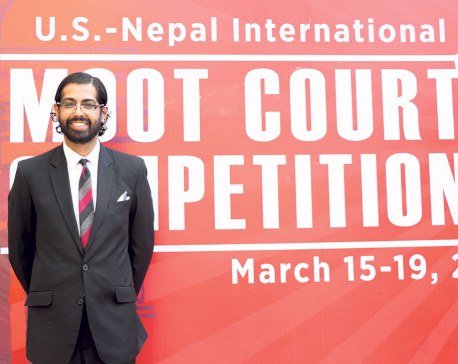
OR
TRC will take int'l law into consideration: Gurung
Published On: June 18, 2016 06:10 AM NPT By: Republica | @RepublicaNepal

KATHMANDU, June 17: Truth and Reconciliation Commission (TRC) Chairman Surya Kiran Gurung has said that the commission will take international law into consideration while investigating conflict-era cases.
Speaking at a function organized by the Social Justice and Human Rights Committee of Parliament Friday, Chairman Gurung said the core values of international law should not be ignored during the investigation of cases from the conflict era.
“A situation might arise tomorrow when our leaders cannot visit foreign countries freely if conflict-era cases are internationalized by the victims,” he said.
Referring to the nine-point deal reached between ruling UML and CPN (Maoist Center) on amending laws concerning transitional justice, Gurung said the commission is guided by law and regulations and is not swayed by any political agreement.
Discussing the practice of transitional justice in Nepal and its challenges, Chairman of the Commission for Investigation of Enforced Disappeared Persons (CIEDP), Lokendra Mallick, claimed that the commission will try to complete all the investigations in the remaining eight months before the deadline set for the commission.
A situation might arise tomorrow when our leaders cannot visit foreign countries freely if conflict-era cases are internationalized.
“If we fail to complete the task, we will obviously ask for an extension of the deadline by a year in line with the legal provision,” said Mallick.
Advocate Gobinda Sharma Bandi said that the ongoing discourse on transitional justice in Nepal is itself problematic.
“The transitional justice mechanism should find out the root causes of the conflict as well as the nature of the human rights violations, but we are focusing only on identifying the victims and perpetrators and prosecuting the perpetrators,” said Bandi.
He said the CIEDP and TRC Act has some ambiguous, vague and incomplete provisions and these should be amended in line with Supreme Court verdicts in conflict-era cases.
“The question of transparency in the formation of the commissions is itself a challenge and the commissions suffer from a trust deficit,” said Bandi. He also said the absence of law criminalizing torture and enforced disappearance as well as the statute of limitations in rape cases are challenges ahead for the transitional justice mechanisms.
You May Like This

Cash fine of up to Rs 200,000 proposed for misconduct by online business operators
KATHMANDU, Jan 3: The government has sought to fine up to Rs 200,000 those traders who carry out online business... Read More...

International law in Nepal is as important as domestic law: Prof Husain
The three-day US-Nepal International Moot Court Competition concluded on Sunday, announcing winners in different categories. Six teams representing six different... Read More...

Kathmandu School of Law wins 58th Jessup International Law Moot Court Competition
KATHMANDU, March 7: Kathmandu School of Law won the national round of the 58th Philip C. Jessup international Law Moot Court... Read More...




Just In
- Fixing a win by outlawing dissent damages democracy
- MoHP cautions docs working in govt hospitals not to work in private ones
- Over 400,000 tourists visited Mustang by road last year
- 19 hydropower projects to be showcased at investment summit
- Global oil and gold prices surge as Israel retaliates against Iran
- Sajha Yatayat cancels CEO appointment process for lack of candidates
- Govt padlocks Nepal Scouts’ property illegally occupied by NC lawmaker Deepak Khadka
- FWEAN meets with President Paudel to solicit support for women entrepreneurship







_20220508065243.jpg)





Leave A Comment